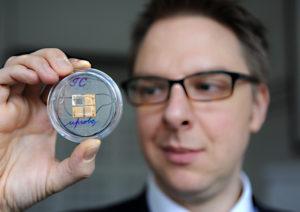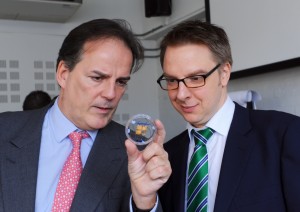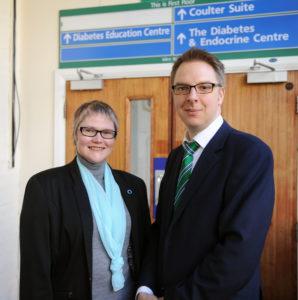 A team of researchers has been undertaking pioneering work into the development of an artificial pancreas for the treatment Type 1 diabetes. Diabetologist Dr Nick Oliver (pictured right) has been leading the work of the Diabetes Technology Research Group at Imperial College London at St Mary’s Hospital. The researchers are part of a global effort to develop artificial pancreas technology. At present the are the only group in the world using a ‘bio-inspired’ approach – mimicking the physiology of the human body.
A team of researchers has been undertaking pioneering work into the development of an artificial pancreas for the treatment Type 1 diabetes. Diabetologist Dr Nick Oliver (pictured right) has been leading the work of the Diabetes Technology Research Group at Imperial College London at St Mary’s Hospital. The researchers are part of a global effort to develop artificial pancreas technology. At present the are the only group in the world using a ‘bio-inspired’ approach – mimicking the physiology of the human body.
The Bio-Inspired Artificial Pancreas (BiAP) is worn externally and combines a continuous glucose monitor that reads the user’s interstitial fluid sugar level. It also has an insulin pump that infuses the insulin into the body. The most innovative element is the biologically-inspired microchip which uses an algorithm to combine the CGM data with the pump’s capacity to infuse insulin. This has enabled the research team to replicate the activity of the beta cells of the pancreas using integrated circuits on a silicon microchip. With this they have been able to “deliver insulin profiles expected in a healthy pancreas”.
Human trials
 The technology has been validated using a patient simulator and now twenty people with Type 1 diabetes aged between 18 and 75 are taking part in the first human clinical trials. These are underway at Imperial College London at St Mary’s Hospital, where the artificial pancreas has now been used for over 500 hours of diabetes control. If the patient trials are successful, the team hopes that the technology will become available to the 400,000-or-so people in the UK with Type 1 diabetes.
The technology has been validated using a patient simulator and now twenty people with Type 1 diabetes aged between 18 and 75 are taking part in the first human clinical trials. These are underway at Imperial College London at St Mary’s Hospital, where the artificial pancreas has now been used for over 500 hours of diabetes control. If the patient trials are successful, the team hopes that the technology will become available to the 400,000-or-so people in the UK with Type 1 diabetes.
The Cities of London and Westminster MP Mark Field (on the left in the picture on the right, with Dr Nick Oliver) visited Imperial College London and St Mary’s Hospital in late January. He has commented, “This technology has the potential to bring huge benefits to thousands of patients by preventing their glucose levels from fluctuating above and below normal levels, eliminating the need for constant counting and guesswork, and helping them lead a normal life. It also offers enormous potential to save the National Health Service money and improve efficiency. I very much enjoyed witnessing this exciting development first hand and look forward to hearing more as the trials progress.”
Field trials
 Mr Field has given his backing to a pledge to improve patient access to medical technology. The pledge is being organised by the Medical Technology Group (MTG), a coalition of patient groups, research charities and medical device manufacturers, which is committed to increasing patient access to high quality, life-improving technologies to all who need it.
Mr Field has given his backing to a pledge to improve patient access to medical technology. The pledge is being organised by the Medical Technology Group (MTG), a coalition of patient groups, research charities and medical device manufacturers, which is committed to increasing patient access to high quality, life-improving technologies to all who need it.
Barbara Harpham, Chair of the MTG, said, “The NHS currently spends around £1 billion on treating the complications of Type 1 diabetes. It is estimated that the use of artificial pancreas technology could save around 80% of that cost, while transforming the lives of people living with the condition. It’s another example of the potential value that medical technology can deliver, and while this technology may not yet be available, I would urge health commissioners to re-examine their approach to existing technology in other areas.”
Dr Oliver added: “Our research is at a very exciting stage for patients and health care professionals. Using the patient simulator we were able to regulate the patient’s blood glucose within target levels 93% of the time. Should these current patient trials, which are the culmination of years of work, prove successful then the next step will be to develop this into a larger scale study that will take this from the clinic to the home.”
One participant in the trial, 32 year old Melissa Holloway from Pimlico, said of her experience, “’My 25-hour BiAP trial session was my first day off from having to think about my blood glucose level every waking hour since I was diagnosed 20 years ago. This research gives me hope for the future for myself and others living with type 1 diabetes.”
About the Medical Technology Group
The Medical Technology Group (MTG) is a coalition of patient groups, research charities and medical device manufacturers working to make medical technologies available to everyone who needs them. Uptake of medical technology in the UK is not as good as it should be, given its great potential to provide value for money to the NHS, patients and taxpayers. The MTG believes that patients and clinicians need better information about medical technologies so that they can make informed choices about their medical care. http://www.mtg.org.uk/http://www.mtg.org.uk/
Type 1 diabetes and the Bio-Inspired Artificial Pancreas
It is estimated that 5% of the UK population has diabetes (Type 1 and Type 2), of which 10% have Type 1 (diabetes mellitus). This is an autoimmune disease in which the beta cells in your pancreas (the cells responsible for sensing your blood glucose and releasing the insulin) get destroyed. Traditional insulin injections solve the problem in the short term, but patients still end up having large glycaemic variability, meaning their blood sugar still fluctuates throughout the day – a leading cause of secondary complications like blindness, heart disease and nerve damage. The bio-inspired artificial pancreas replicates the work of the damaged cells taking the job of controlling blood sugar away from the individual.
The Diabetes Technology Research Group
The Diabetes Technology Research Group is a multidisciplinary group of biomedical engineers and clinical researchers. Funding for the artificial pancreas is being provided by The Wellcome Trust. Funding for the novel continuous glucose sensor is from the National Institute for Health Research (NIHR).
This news item first appeared in our free-to-receive online magazine. Go to the top of this page to sign up – we just need your email address.



